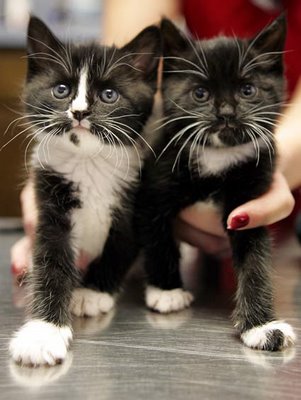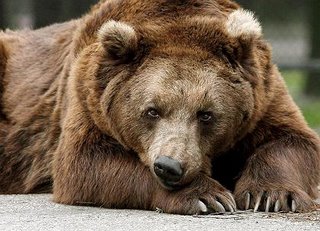Global Warming Blamed for Unseasonable Increase in Feral Kitten Births on Long Island

"One cat just leads to another."
-- Ernest Hemingway
Already implicated in the melting of ice at the poles and rising sea levels, global warming is now being blamed for a spike in the number of feral kittens being born in the dead of winter on Long Island. (Pictured above are a couple of four-weeks-old kittens residing at the East Meadow Animal Hospital.)
This unexpected development has caught shelters off guard and even prompted the Long Island Humane and Dog Protective Association in Freeport to stop taking in any more kittens. "We have just been inundated with calls (about kittens)," the no-kill facility's Maria Cross told Newsday on January 7th. (See "Warm Weather Translates to More Kittens.") "Usually, by November, December, it ends. It just hasn't this year."
Last Hope Animal Rescue and Rehabilitation in Huntington is also feeling the pinch. "From an animal rescue organization's perspective, January and February have always been our regrouping months because animals weren't really reproducing," the organization's Linda Stuurman told Newsday in the article cited supra. "But we're having kittens being born all year-round."
Although the warmer temperatures may be problematical for cats, they have proven to be beneficial for dogs. Usually the adoption rate for canines drops during the winter because people do not want to go to the trouble of house-training them in inclement weather.
This winter, however, adoptions have surged. "Saturdays have been hopping for us," Susan Hassett of the North Hempstead Animal Shelter told Newsday. "If we get a couple of extra weeks, it's wonderful for us."
As far as it is known, only shelters on Long Island have reported an increase in the number of feral kittens being born due to changes in the feline fertility cycle caused by global warming. Although the northeast, with the notable exception of Buffalo, and the south have so far experienced an unusually mild winter, the northwest and the Rockies have been getting clobbered for months and, more recently, the midwest also has been hit hard by winter storms.
For the past week or so temperatures have been dropping in the northeast, however, and southern New Jersey received its first snowfall of the season Sunday night. Prior to that, buds had already appeared on many trees and shrubs and ticks, mosquitoes, bees, ants, and other insects had put in cameo appearances.
Since the normal gestation period for cats is on the average sixty-five days, this recent cold snap should not measurably affect the number of kittens that are already on the way. If the cold weather hangs around for a while, feline fertility rates are expected to return to normal.
The bad news is that global warming is only going to get worse. Extended breeding seasons will not only tax the resources of shelters and those who care for feral colonies but, worst still, it will lead to even higher feral kitten mortality rates. Contrary to the lies spread by ailurophobes and others, only about twenty per cent of kittens born in the wild survive.

Not only are food and shelter scarcer during the wintertime, but the newborns do not have any way of coping with rapid changes in the weather. It is not uncommon in the northeast for temperatures to be sixty degrees Fahrenheit one day and fifteen degrees a few days later. Also, snowy and icy conditions often follow on the heels of warm and sunny days. Under such adverse conditions, untold numbers of feral kittens are doomed to die of starvation and exposure.
Bears are also being adversely affected by global warming. Most notably a death vigil has already begun for polar bears due to the rapid melting of ice in the Arctic. (See photo above of two of them cavorting in Churchill, Manitoba.)
In the Alps, brown bears (See photo below) are having difficulty hibernating because of the warmer temperatures and in Russia officials have warned people to be on the lookout for bears who have become aggressive due to a lack of sleep. (See Der Spiegel, January 12, 2007, "Russians Warned to Stay Away from Grumpy Insomniac Bears.") Meanwhile, at a safari park in Sweden, brown bears were more than two months late in going into hibernation this winter. (See Agence France Presse, January 11, 2007, "Weird Winter Leaves Europeans, North Americans Warm but Puzzled.")
The data are incontrovertible: Mother Earth is dying. The polar icecaps and iceberg are melting at an alarming rate and the oceans are pockmarked with more than one-hundred-fifty dead zones. The Pacific island of Tuvalu is in the process of disappearing form the map due to rising sea levels. Tant pis, scientists are predicting that more than half of the world's animals and plants will be extinct by the end of this century.
Alarmingly, little or nothing is being done about this impending catastrophe. Exxon-Mobil, aided and abetted by the National Science Teachers Association and others, is still proclaiming global warming to be a hoax. George Bush, who once blamed rising temperatures on pigs farting, dispatched his Solicitor General to the United States Supreme Court in November to argue that auto emissions are not pollutants within the meaning of the Clean Air Act. (See Massachusetts v EPA.)
Climate change is treated seriously by both politicians and the media in Europe, but it remains to be seen if the EU has the political will to meet even its own rather modest carbon reduction goals. (See London's Independent, January 11, 2007, "EU: Climate Change Will Transform the Face of the Continent.")
Led by the nose down the path to ecological perdition by moneygrubbing western multinationals, China is choking to death on its own air and water pollution. For example, the BBC reported last week that three-hundred-thousand Chinese drink polluted water and that schoolchildren regularly attend classes in buildings coated with soot and other contaminants.
In addition to discrediting and ignoring global warming, the world's other response has been to cash in on it. Shipping companies are salivating about all the money they are going to save now that an ice-free Northwest Passage is about to become a reality. Winegrowers in southern England are ecstatic about rising temperatures that will give them a climate similar to parts of France.
The news is not all bad, however. Furriers are crying in their champagne because of slow sales, but they should have been put out of business long ago. Warmer winters are decreasing the demand for heating oil, but this boon will be more than negated by hotter summers which will augment the demand for coal in order to power air conditioning units. This effect is most noticeable on the Continent where cool summers once made air conditioning superfluous.
Ski resorts in the Alps and elsewhere around the world face an uncertain future. Many of them will be forced to either close or to move their operations higher into the mountains. Most likely they will choose the latter option and this will imperil the existence of many animals and birds who live at the higher elevations. (See BBC, January 17, 2007, "High Ski Runs Fuel Habitat Fears.")

Despite the potentially dire impact that these elevated pistes will have on such birds as the rock partridge, the red-billed chough, and the wheatear, no one ever hears bird advocates attacking the operators and patrons of ski resorts. Mountaintop mining is likewise destroying Appalachia and the habitat of the Cerulean Warbler and other species of birds but yet bird lovers neither go after coal mining companies nor forgo air conditioning in their homes and offices.
The relief provided by air conditioning is transitory; in reality, it is only making the planet hotter. The same thing applies to development and especially the cutting down of trees, but neither the National Audubon Society nor the diabolical American Bird Conservancy has a negative word to say about development.
Polluters and bird lovers have much in common and not the least of which is a willingness to ignore all evidence to the contrary in order to promote their fascist agendas. Just as the energy companies and their bought and paid for political stooges go to great lengths to deny the reality of global warming, bird lovers likewise proclaim to the world that their charges are only threatened by cats.
Photos: Howard Schnapp of Newsday (kittens), Wikipedia (polar bears), and Deutsche Presseagentur (brown bear).

<< Home